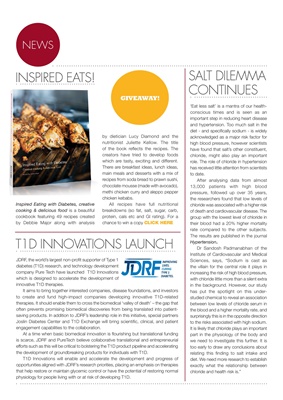
NEWS
SALT DILEMMA
CONTINUES
‘Eat less salt’ is a mantra of our health-
conscious times and is seen as an
important step in reducing heart disease
and hypertension. Too much salt in the
diet - and specifically sodium - is widely
acknowledged as a major risk factor for
high blood pressure, however scientists
have found that salt’s other constituent,
chloride, might also play an important
role. The role of chloride in hypertension
has received little attention from scientists
to date.
After analysing data from almost
13,000 patients with high blood
pressure, followed up over 35 years,
the researchers found that low levels of
chloride was associated with a higher risk
of death and cardiovascular disease. The
group with the lowest level of chloride in
their blood had a 20% higher mortality
rate compared to the other subjects.
The results are published in the journal
T1D INNOVATIONS LAUNCH Hypertension.
Dr Sandosh Padmanabhan of the
Institute of Cardiovascular and Medical
JDRF, the world’s largest non-profit supporter of type 1 Sciences, says, “Sodium is cast as
diabetes (T1D) research, and technology development the villain for the central role it plays in
company Pure Tech have launched T1D Innovations increasing the risk of high blood pressure,
which is designed to accelerate the development of with chloride little more than a silent extra
innovative T1D therapies. in the background. However, our study
It aims to bring together interested companies, disease foundations, and investors has put the spotlight on this under-
to create and fund high-impact companies developing innovative T1D-related studied chemical to reveal an association
therapies. It should enable them to cross the biomedical ‘valley of death’ – the gap that between low levels of chloride serum in
often prevents promising biomedical discoveries from being translated into patient- the blood and a higher mortality rate, and
saving products. In addition to JDRF’s leadership role in this initiative, special partners surprisingly this is in the opposite direction
Joslin Diabetes Center and T1D Exchange will bring scientific, clinical, and patient to the risks associated with high sodium.
engagement capabilities to the collaboration. It is likely that chloride plays an important
At a time when basic biomedical innovation is flourishing but translational funding part in the physiology of the body and
is scarce, JDRF and PureTech believe collaborative translational and entrepreneurial we need to investigate this further. It is
efforts such as this will be critical to bolstering the T1D product pipeline and accelerating too early to draw any conclusions about
the development of groundbreaking products for individuals with T1D. relating this finding to salt intake and
T1D Innovations will enable and accelerate the development and progress of diet. We need more research to establish
opportunities aligned with JDRF’s research priorities, placing an emphasis on therapies exactly what the relationship between
that help restore or maintain glycemic control or have the potential of restoring normal chloride and health risk is.”
physiology for people living with or at risk for developing T1D.